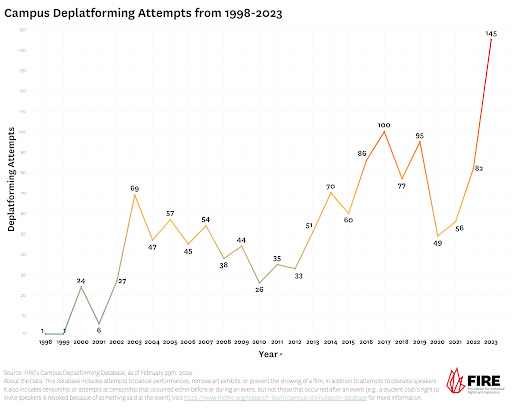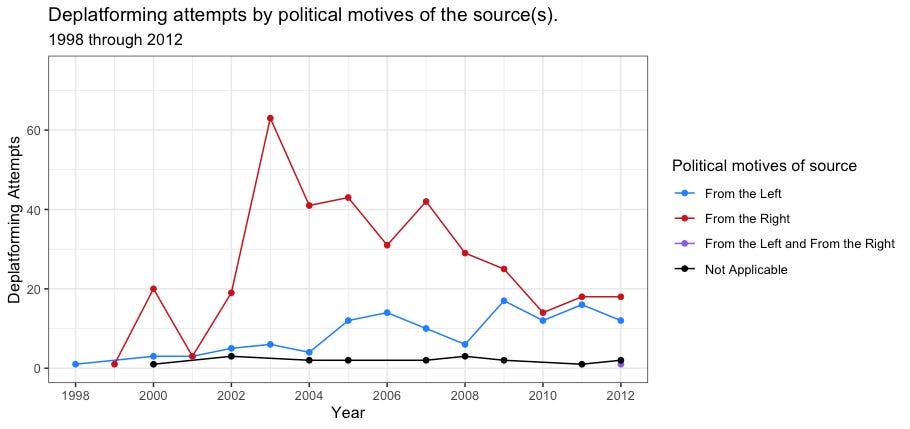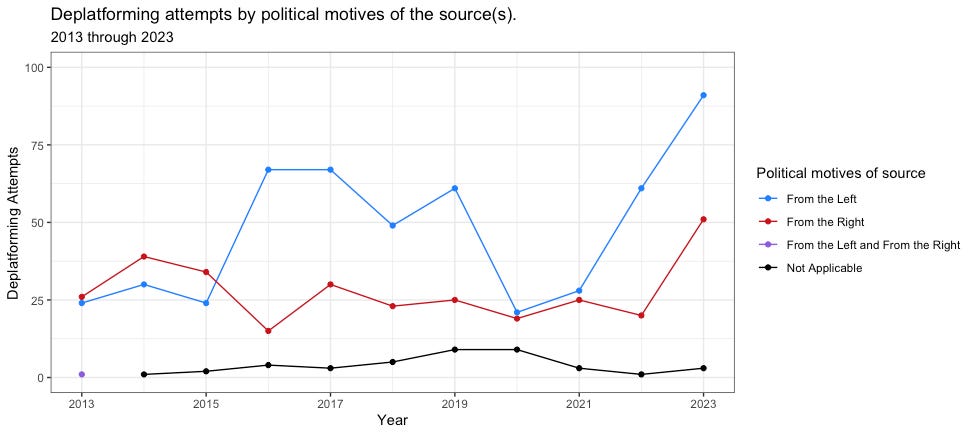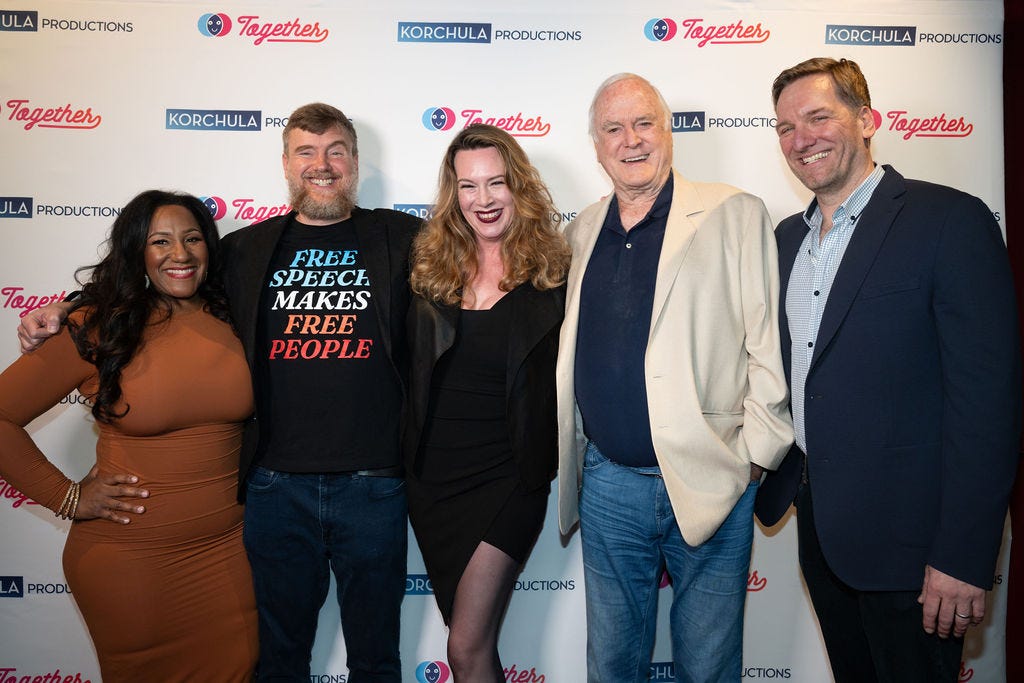Campus deplatforming: A data bonanza
2023 was the worst year on record for deplatforming attempts. 2024 is on track to beat it.
Whenever people argue that we’re exaggerating or overemphasizing the free speech crisis on campus, we have to take a deep breath and count to 50 — sometimes 100. We have been pummeling the public with numbers and data about shout downs, heckler’s vetoes, and disinvitations and deplatforming of campus speakers for years, and it can be exhausting to hear people continue to dismiss it as a non-issue.
But honestly, all we have to do is wait — because you can set a watch to the emergence of new examples that prove our point. As we will show below, 2023 was the worst year on record for deplatforming attempts and successes, and 2024 is unfortunately already looking like it can top it.
The last couple of weeks alone have been absolutely terrible, and it’s no surprise why. Campuses exploded in the wake of Hamas’ attack on Israel on Oct. 7, with attempts to deplatform speakers coming in about equal numbers from both sides. However, as of this moment we are not aware of a pro-Palestine event being disrupted by pro-Israel students. The most recent examples we have are all pro-Palestinian protestors shutting down pro-Israel speech.
On Feb. 21, a lecture by Democratic Representative Derek Kilmer at the University of Puget Sound was interrupted and ultimately canceled when a group of protesters forced their way into the lecture hall — past security, metal detectors, and doors — and onto the stage. Chaplain Dave Wright, along with other students and university staff, were injured as a result of the protests. And because protesters also attempted to enter other buildings, University Security Services locked the campus down for over an hour.
Last week, a speaking event at UC Berkeley featuring Israeli Defense Forces reservist and lawyer Ran Bar-Yoshafat was canceled because a mob of angry protestors — hundreds of them — surrounded the venue, broke glass doors, prevented students from entering, and forced their way into the building in a premeditated attempt to, in their own words, “SHUT IT DOWN.”
At the same time, at San Jose State University, a guest lecture by Jeffrey Blutinger was canceled and Blutinger had to be escorted away by police due to a (once again, premeditated) protest that devolved into violence.
This has been happening for a long time, and it will keep happening until universities grow backbones. They have to start disciplining students who organize disruptions and the deplatforming of speakers, and they must expel students who engage in violence on campus. Greg and our FIRE colleague Angel Eduardo published a piece in The Free Press last week arguing this very point.
Anyone still claiming that this is no big deal, that it’s just a fluke or flare-up, and that it is not at all the norm in higher ed today has to willfully ignore the data — and we at FIRE have a lot of data on this.
FIRE’s new Campus Deplatforming Database
Last month, FIRE released its Campus Deplatforming Database, an expansion and evolution of its previous Campus Disinvitation Database. In addition to tracking attempts to disinvite speakers from campus, this enhanced database now includes attempts to cancel performances, take down art exhibits, and prevent the screening of films. It spans the past two and half decades, with recorded attempts going all the way back to the heyday of the Backstreet Boys, 1998.
A broad analysis and overview of the deplatforming attempts reveals a number of troubling findings.
As of Feb. 29 of this year, FIRE has recorded 1,406 deplatforming attempts — an average of 53 per year, if you exclude the 28 deplatforming attempts that have already been recorded in the first two months of 2024 (which is itself alarming).
Five hundred and fifty eight of those deplatforming attempts (39%) have been successful. These include the cancellation of a screening of “Zoolander 2” at Claremont McKenna College in 2016 because it does not portray the LGBTQ community positively; the pulling of the fire alarm during a screening of FIRE’s own documentary “Can We Take a Joke?” at UC Irvine in 2016; and the cancellation of a performance of “The Vagina Monologues” at Mount Holyoke College because the play excludes the experiences of transgender women in 2015.
The successful attempts include 130 substantial event disruptions, such as the shameful shout down of 5th Circuit Judge Kyle Duncan at Stanford Law School — Greg’s alma mater — in 2023. Greg’s book with Rikki Schlott, “The Canceling of the American Mind,” devotes an entire chapter to the Kyle Duncan incident as a perfect example of all the illegitimate techniques to shut down disfavored speech on campus today. To their credit, Stanford apologized for the incident, and Stanford Law Dean Jenny Martinez sent a message to all students emphasizing the importance of free speech on campus. But the problem is clearly bigger than Stanford Law or any one incident, so constant vigilance — including at Stanford — is warranted.
It’s also worth mentioning that the Campus Deplatforming Database also includes 131 unsuccessful attempted disruptions of events. It may seem odd to include failures here, but whether they succeeded or not, they are a clear indicator of a concerning climate against the principles of free speech on campus.
The wrath of The Cardinal Newman Society
Private religious institutions account for 42% (590) of all recorded deplatforming attempts, state colleges and universities account for about a third (467), and about 24% (334) occurred at private secular colleges and universities. The remaining 15 occurred at community colleges.
The prominence of religious institutions in the Campus Deplatforming Database is the result of a two-decade long campaign by The Cardinal Newman Society, a non-profit activist organization that works to promote and defend faithful Catholic education, to pressure Catholic colleges and universities to cancel performances of “The Vagina Monologues” or rescind invitations to “scandalous” commencement speakers.
Between 1998 and 2012, for instance, The Cardinal Newman Society targeted 185 performances of “The Vagina Monologues” for cancellation and 108 “scandalous” commencement speakers for disinvitation, including Barack Obama, Bill Clinton, and Hillary Clinton (multiple times). This means that, according to the Campus Deplatforming Database, from 1998 through 2012, the majority of deplatforming attempts targeted pro-choice and pro-gay speech at Catholic colleges and universities. This also means that deplatforming attempts during this time period came primarily from the right of the controversial expression.
Specifically from 1998 through 2012, almost three quarters (367 of 507, or 72%) of the deplatforming attempts recorded came from the right — an average of 24 attempts per year. More than a quarter (102, or 28%) of these deplatforming attempts were successful, including multiple instances where controversial left-wing figures like William Ayers and Ward Churchill had speaking invitations rescinded following deplatforming campaigns. In contrast, from 1998 through 2012, 121 deplatforming attempts from the left occurred — an average of 8 attempts per year. Forty-nine (or 40%) of these deplatforming attempts were successful, including Anne Coulter’s disinvitation by the College Republicans at Fordham following student protests, the dousing of Pat Buchanan in salad dressing during a speech at Western Michigan, and Tom Tancredo ending a speech at UNC Chapel Hill early because a protester threw a rock and broke a window at the venue.
The rise of the illiberal left on campus
About a decade ago, things began to change. In 2013, a record-number 24 deplatforming attempts from the left of the controversial expression occurred. This was double the previous year’s total and nearly equal to the 26 deplatforming attempts recorded from the right. These attempts from the left targeted a number of conservative political figures such as Scott Brown, Ben Carson (twice), Tom Corbett, Peter King, Karl Rove, Paul Ryan, and Tim Scott. The record was broken the next year, when 30 deplatforming attempts came from the left. These attempts targeted a menagerie of speakers, movies, and artwork — including Bill Maher for “Islamophobic” comments, multiple screenings of the film “Honor Diaries” for “Islamophobic” content, and Kennesaw State University’s president Daniel Papp removing an 1899 magazine article that rationalized lynching from an art installation after pushback from KSU administrators.
In 2016 and 2017, the record for attempts from the left of the controversial expression was broken again, when 67 attempts were recorded from the left in both years. Last year, a new record was set: 91 deplatforming attempts came from the left, with the most frequent targets including Riley Gaines, Michael Knowles, and Matt Walsh — each of whom were targeted multiple times — primarily because of their views on transgender issues.
Since 2013, 523 deplatforming attempts have occurred from the left — an average of 48 per year. This is six times the average recorded from 1998 through 2012. In contrast, 316 attempts from the right per year have occurred since 2013, an average of 26 per year. From 1998 through 2012, 367 attempts came from the right — an average of 24 per year.
2023 and beyond
In 2023, FIRE’s Campus Deplatforming Database recorded a record-setting 145 deplatforming attempts, of which a record-setting 75 (or 52%) succeeded. These 75 successful deplatforming attempts include 29 speakers who had their events substantially disrupted. Another 23 speakers experienced attempts to disrupt their events last year — meaning over a third of recorded deplatforming attempts in 2023 tried to disrupt a speaking event in progress.
Sadly, even though we’re only two months into the new year, 2024 is already on pace to shatter these records. As of Feb 29, 2024 FIRE’s Campus Deplatforming Database has already recorded 28 deplatforming attempts — including 13 speakers who faced attempts to disrupt their events, seven speakers who have had their speaking invitations rescinded, and the three substantial event disruptions we describe at the beginning of this article.
What’s worse is that since FIRE updated its Campus Deplatforming Database on Feb 29:
An event with Representative Daniel Kurtzer was disrupted multiple times by pro-Palestinianprotesters during a speech at the University of Washington, forcing the Q&A session to end early.
Campus police at UNLV escorted Asaf Peer, a physics professor at Bar Ilan University in Israel, out of his invited talk after pro-Palestininian protesters entered the room with banners and flags and began shouting him down. During the shout down, Peer was told by the campus police that they could not remove the protesters from the venue because doing so would be an infringement of the protesters free speech rights.
An aide to Senator Joe Manchin threw a climate advocacy group protester to the ground after the group interrupted Manchin’s talk at the Harvard Kennedy School and one of the protesters called Manchin a “sick fuck” for his ties to the fossil fuel industry. Manchin finished his remarks.
Security at the University of Chicago’s medical school escorted pro-Palestinian protesters out of a lecture hall for attempting to disrupt a talk by the new President of the American Medical Association, Jesse Menachem Ehrenfeld. Ehrenfeld is a gay, Jewish man.
It seems we can’t update the database fast enough to keep current with the madness on campus.
We are never going to run out of issues that anger and polarize us. We will never be at a loss for things to argue about, disagree with, or protest over. But unless our institutions of higher education start taking a determined approach to preserving free speech on campus — and unless they start disciplining any student who crosses the line into the heckler’s veto and violence — this problem will continue to get worse. Allowing this allows the angriest, most violent, most intolerant bullies to have their way with our universities. It is ceding our discourse to people who have a “might makes right” approach to what speech can and cannot be heard.
If we don’t want that to happen, alumni, students, professors, and colleges themselves better start acting now. And if they need our help, FIRE is always here.
SHOT FOR THE ROAD
The “The Coddling of the American Mind” documentary is now available for paid subscribers of The Coddling of the American Mind Substack.









The feeling I have is such deja-vu. The Caltech LGB group was prevented at the last moment in 1985 from hosting a speaker from Johns-Hopkins (who was a Harvard Fellow) on "Lust, Love and Limerance" because "Lust" was unacceptable in the title.
The deplatforming on the right and left are therefore fundamentally different. If the Newman people object to Catholic institutions hosting anti-Catholic speakers or performances that is different from Palestinian supporters objecting to Jewish speakers at secular institutions. Nazis and Skokie and all that but would you consider it deplatforming if a Jewish institution didn't allow neoNazis to speak? Or if a HBCU did not welcome the KKK?